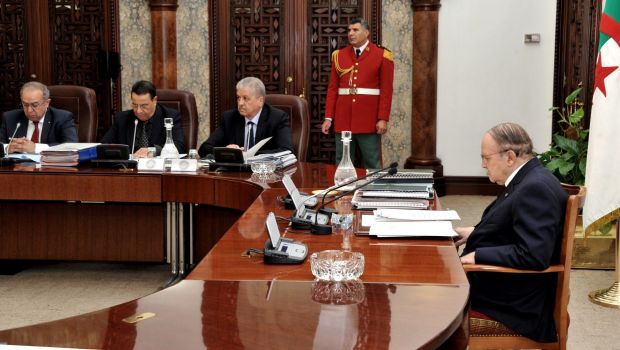
Algerian President Abdelaziz Bouteflika (R) attending a cabinet meeting in Algiers (AFP PHOTO / HO / APS)
The Islamist Movement of Society for Peace (MSP), led by Abderazzak Makri, launched efforts to find a joint candidate two months ago by opening dialogue with similar parties, such as the Ennahda Movement led by Fateh Rebai, the Movement for National Renewal led by Djahid Younsi, and the Justice and Development Front led by Abdallah Djaballah.
A number of meetings took place recently between the four leaders in Algiers, without reaching agreement on a candidate.
Rebai told Asharq Al-Awsat that the leaders “were still discussing the nomination of a single candidate.”
“It is too early to talk about failure because the elections are still a long way away and we will find common ground in the end,” he added.
Rebai also said “it is not imperative that the candidate is one of us or even from within the Islamist movement. What is important is for certain qualities to be present, the most important of which is to be distant from the regime and the suspicion of corruption, and to respect the principles and fundamental values of Algerian people, such as Islam and the Arabic language.”
A source who followed the meetings between the four Islamist leaders said Djaballah expressed reservations about the efforts to find a consensus candidate. He was quoted as saying he would not participate in the elections in any form.
While some latitude exists in elections for municipal and other local posts, in Algeria influential figures within the military are reported to wield enough influence to ensure their choice of candidate becomes president. All of Algeria’s presidents since independence in 1962 have reached power from the within the previous administration, with most coming from within the military itself.
Meanwhile, former Prime Minister Ahmed Benbitour announced his candidacy a few months ago, while reports say another former prime minister, Ali Benflis, is preparing to do so.
Benbitour has sought to raise his public profile, adopting the slogan “peaceful change so that Algeria does not suffer the revolutions seen in some Arab states.”
Benflis, meanwhile, has reportedly informed those close to him that he will run in the elections even if Bouteflika—his main rival in the 2004 elections, which Bouteflika won by a landslide—is nominated.
Benflis enjoyed some support from within Algeria’s military-dominated government in the 2004 election, notably from the Chairman of the Chief of Staff of the Army, Brigadier General Mohamed Lamari, who was against Bouteflika’s candidacy, while intelligence chief Mohamed Mediene took an opposing stance.
Secular opposition parties have not shown the same enthusiasm about the presidential elections as their Islamist counterparts. The most prominent, the Rally for Culture and Democracy, has been absent from the arena since the resignation of its president Said Saadi two years ago. Another party, the Socialist Forces Front, has lost popular ground since the death of its legendary leader, Hocine Aït Ahmed.

Trackbacks/Pingbacks